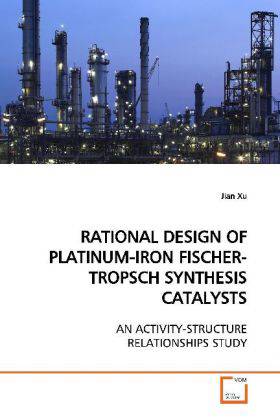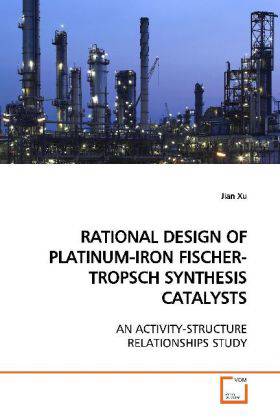
Bedankt voor het vertrouwen het afgelopen jaar! Om jou te bedanken bieden we GRATIS verzending (in België) aan op alles gedurende de hele maand januari.
- Afhalen na 1 uur in een winkel met voorraad
- In januari gratis thuislevering in België
- Ruim aanbod met 7 miljoen producten
Bedankt voor het vertrouwen het afgelopen jaar! Om jou te bedanken bieden we GRATIS verzending (in België) aan op alles gedurende de hele maand januari.
- Afhalen na 1 uur in een winkel met voorraad
- In januari gratis thuislevering in België
- Ruim aanbod met 7 miljoen producten
Zoeken
RATIONAL DESIGN OF PLATINUM-IRON FISCHER-TROPSCH SYNTHESIS CATALYSTS
AN ACTIVITY-STRUCTURE RELATIONSHIPS STUDY
Jian Xu
Paperback | Engels
€ 58,45
+ 116 punten
Omschrijving
Silica-supported iron catalysts were prepared using
an advanced non-aqueous evaporative deposition
technique, which leads to a catalyst with high
extents of reduction, high CO conversions, and high
C2+ hydrocarbons productivities. The catalysts were
tested following an L18 orthogonal array statistical
design approach. Primary independent variables
affecting catalysts activity were promoter type,
pretreatment gas composition, pretreatment and
reaction temperature. Steady state catalytic
activity is positively correlated with increasing
bulk chi-carbide content for silica-supported Fe and
FePt catalysts but not for FePtK.
The bulk and surface carbonaceous species was both
measured with high pressure in situ Mössbauer
spectroscopy and TPSR-MS. A correlation between the
amount of reactive -carbon (C ) and initial
catalytic activity was established. An modified
method was proposed for quantitative measurement of
irreversible CO site density on the iron catalysts.
Finally, a comprehensive model was proposed for iron
phase transformations during pretreatment, FTS and
post-reaction passivation/oxidation.
an advanced non-aqueous evaporative deposition
technique, which leads to a catalyst with high
extents of reduction, high CO conversions, and high
C2+ hydrocarbons productivities. The catalysts were
tested following an L18 orthogonal array statistical
design approach. Primary independent variables
affecting catalysts activity were promoter type,
pretreatment gas composition, pretreatment and
reaction temperature. Steady state catalytic
activity is positively correlated with increasing
bulk chi-carbide content for silica-supported Fe and
FePt catalysts but not for FePtK.
The bulk and surface carbonaceous species was both
measured with high pressure in situ Mössbauer
spectroscopy and TPSR-MS. A correlation between the
amount of reactive -carbon (C ) and initial
catalytic activity was established. An modified
method was proposed for quantitative measurement of
irreversible CO site density on the iron catalysts.
Finally, a comprehensive model was proposed for iron
phase transformations during pretreatment, FTS and
post-reaction passivation/oxidation.
Specificaties
Betrokkenen
- Auteur(s):
- Uitgeverij:
Inhoud
- Aantal bladzijden:
- 152
- Taal:
- Engels
Eigenschappen
- Productcode (EAN):
- 9783639161311
- Uitvoering:
- Paperback
- Afmetingen:
- 220

Alleen bij Standaard Boekhandel
+ 116 punten op je klantenkaart van Standaard Boekhandel
Beoordelingen
We publiceren alleen reviews die voldoen aan de voorwaarden voor reviews. Bekijk onze voorwaarden voor reviews.









